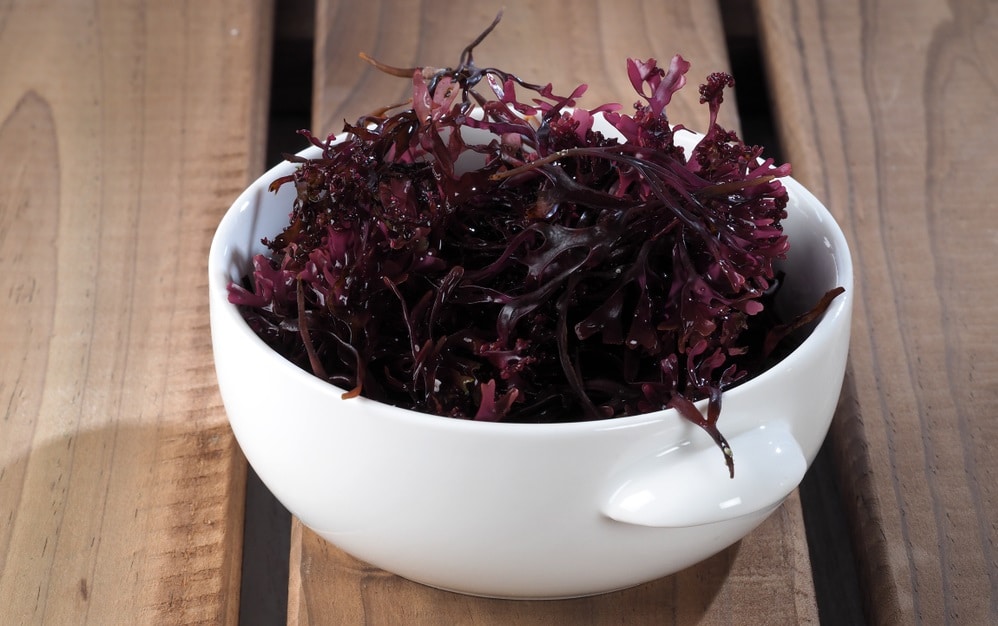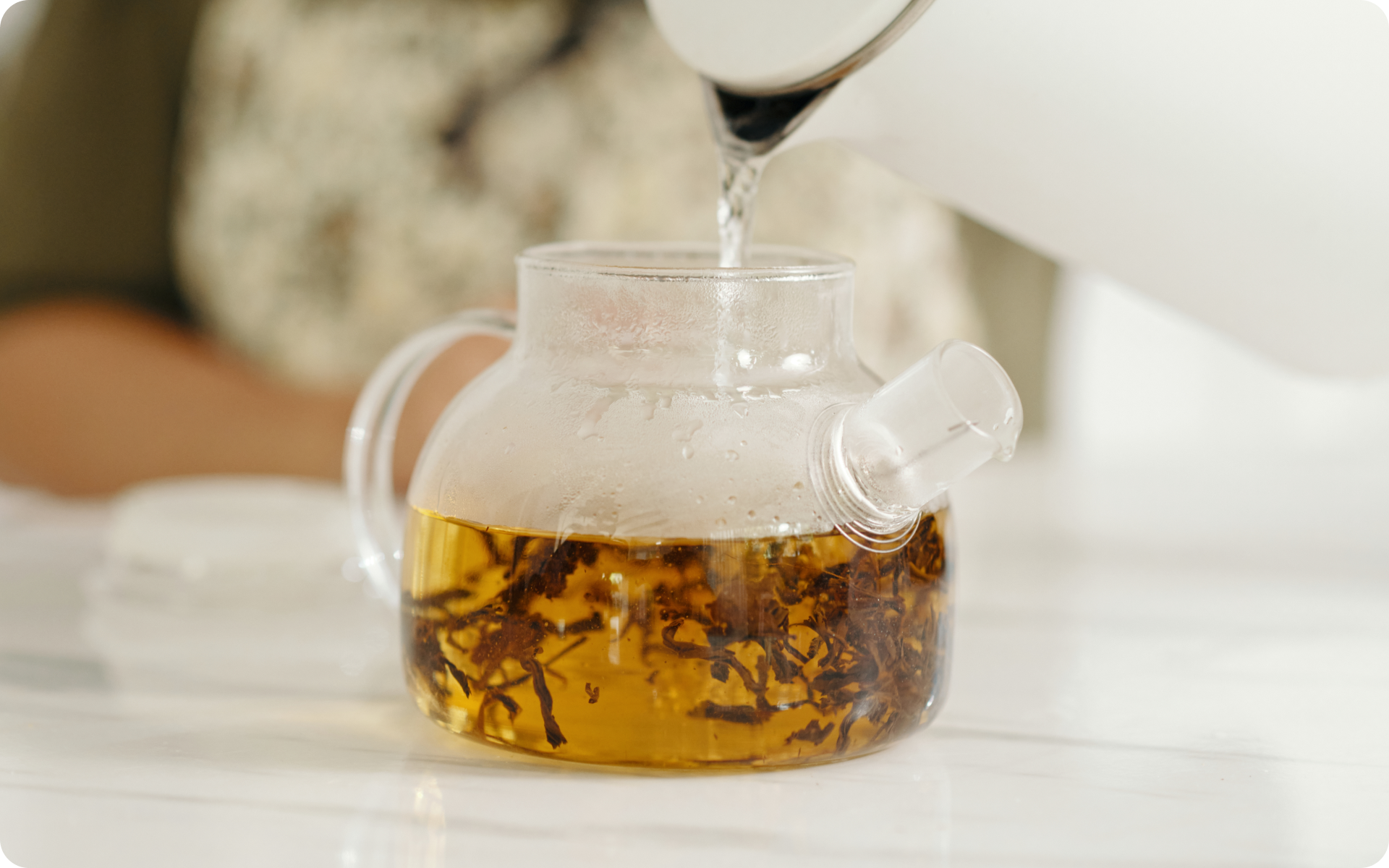Sea moss (Chondrus crispus) is a type of red algae that grows near the coastlines of Ireland and North America. Historically, it’s been used as a folk remedy for a variety of ailments. In recent years there has been a resurgence in its popularity, particularly as more people look for natural ways to boost their health and lose weight. This article will review the evidence and practices behind using sea moss for weight loss to see if there’s any truth to the claims. We’ll also look at other health benefits and the side effects of sea moss.
Get your personalized
meal plan!
Sea Moss Nutritional Profile
Also known as Irish moss or red algae, sea moss is a type of seaweed that’s rich in several vitamins and minerals, including (12):
- Iron
- Phosphorus
- Magnesium
- Calcium
- Zinc
- Copper
- Folate
- Riboflavin
Sea moss also contains compounds like carrageenan and alginate, which are believed to have health benefits.
Carrageenan is a substance that’s often used as a food thickener or emulsifier. Alginate is a type of fiber that can bind to other compounds, including toxins and heavy metals. For this reason, alginate is sometimes used in supplements which claim to detoxify the body.
Is Sea Moss Good For Weight Loss?
There’s currently no research examining the effects of sea moss specifically for weight loss. However, some of its nutrients and compounds are theorized to be able to promote weight loss by affecting certain processes in the body.
Here are seven ways that sea moss might potentially help with weight loss:
It May Boost Metabolism
Sea moss contains iodine, which is a key component of thyroid hormones. These hormones play an important role in regulating metabolism. A higher metabolic rate means that you burn more energy, which could potentially lead to weight loss (8).
Simply eating more iodine won’t automatically increase everyone’s metabolic rate, but if you have impaired thyroid function (hypothyroidism) due to not getting enough iodine, then in that case increasing your iodine intake should help (10). Talk to your doctor if you suspect that something isn’t right with your thyroid.
It May Suppress Appetite
Alginates, the fibers found in sea moss, can bind to water and form a gel-like substance. This may help slow down digestion and make you feel full longer.
The role of fiber in weight loss is well-established. For example, one study showed that increasing fiber intake by 14 grams per day was linked to a 10% decrease in calorie intake and a 1.9 kg reduction in body weight over a period of four months (4).
Read More: 3-Day Plateau Diet: Is This Plan The Quickest Way Out Of A Weight Loss Plateau?
It May Promote Fat Burning
Sea moss contains compounds like carrageenan, which may have an effect on fat metabolism (5).
This might work by regulating enzyme systems that promote fat burning and discourage the storage of fat in cells. AMP-activated protein kinase is one such enzyme system (5).
In fact, one study showed that carrageenan was able to reduce the gains in body fat in mice on a high-fat diet, and had positive effects on the gut microbiomes of the animals. However, more research is needed to explore these possible effects in humans.
It May Balance Blood Sugar Levels
Sea moss may help keep blood sugar levels in check by slowing down carbohydrate absorption. This is important because spikes in blood sugar can lead to hunger and cravings, both of which can sabotage weight loss efforts (1).
When used alongside a healthy diet and lifestyle, sea moss and other fiber-rich foods may help keep blood sugar levels in check and promote weight loss.
It May Help Remove Toxins From The Body
Sea moss contains alginates, which may be able to bind to toxins and heavy metals in the gut and thereby help them be eliminated from the body. This process is known as adsorption (9).
It May Reduce Inflammation
Sea moss is a good source of magnesium, a mineral that’s known for its anti-inflammatory effects.
Chronic inflammation has been linked to obesity and other chronic diseases like heart disease and diabetes (3).
The reduction of inflammation may help improve overall health. Sea moss also contains small amounts of other nutrients that have anti-inflammatory effects, including vitamins A and C.
It May Have A Prebiotic Effect
Sea moss is a source of soluble fiber, which feeds the beneficial bacteria in your gut. This type of fiber is also known as prebiotic fiber (13).
Prebiotics are important for gut health because they help keep the balance of good and bad bacteria in check. This balance could be crucial for weight loss because it may help regulate appetite and metabolism (13).
Lean and toned up body isn’t just a far-fetched fantasy. Check out the BetterMe app and watch it propel your weight loss journey into high gear!
How Do You Use Sea Moss For Weight Loss?
If you’re interested in using sea moss for weight loss, there are a few ways to add it to your diet.
Here are some ideas:
- Add it to smoothies.
- Make sea moss gel and add it to soups or stews.
- Use it as a vegan replacement for gelatin in recipes.
- Add it to juices or drink it as a tea.
- Take sea moss capsules as a supplement. (Talk to your doctor first).
How Long Does Sea Moss Take To Work?
There is no one-size-fits-all answer to this question. The effects of sea moss on weight loss are not yet understood and may vary depending on factors like a person’s age, weight, and activity level.
A Word Of Caution
While sea moss might offer some benefits for weight loss, it’s important to remember that even if it works, it’s not a miracle cure. No single food or supplement can magically melt away excess body fat.
Weight loss requires making lifestyle changes like eating a healthy diet and getting regular exercise. Adding sea moss to your diet may help support your weight loss efforts, but it’s not likely to produce results on its own.
If you’re interested in using sea moss for weight loss, talk to your healthcare provider first. They can give you personalized advice and let you know if it’s safe for you.
Also, make the following changes to create a calorie deficit and lose weight safely while using sea moss:
Reduce Your Portions
Portion control is one of the most important aspects of weight loss. If you’re eating more calories than your body needs, you won’t lose weight no matter what you eat.
To create a calorie deficit, aim to reduce your portion sizes by 10–20%. This will help you consume fewer calories overall and promote weight loss.
Eat More Whole Foods
Whole foods are an important part of any weight loss diet. They’re packed with nutrients and tend to be lower in calories than ultra processed foods.
Focus on eating more whole foods like fruits, vegetables, lean protein, and whole grains. These foods will help you feel fuller for longer and promote weight loss.
Read More: Moringa Weight Loss: Does It Work?
Cut Back On Refined Carbs
Refined carbs like white bread and pasta are high in calories but low in nutrients. Eating too many of these foods can lead to weight gain (2).
To promote weight loss, cut back on refined carbs and replace them with healthier options like whole-grain bread and brown rice.
Increase Your Physical Activity
Physical activity is key for weight loss. It helps you burn more calories and build muscle, which can help boost your metabolism.
Aim to get at least 30 minutes of moderate-intensity exercise most days of the week. This could include activities like brisk walking, swimming, or cycling. You can also try HIIT (high-intensity interval training) workouts to maximize fat burning (7).
Additionally, strength-training exercises like lifting weights can help you build muscle, which can also promote weight loss.
To make it easier to get started, try adding 10-minute bursts of activity throughout your day. For example, you could take a brisk walk during your lunch break or do some jumping jacks after dinner.
Looking for a way to break the vicious cycle of weight loss and tone up all the jiggly parts? Watch the extra pounds fly off and your muscles firm up with the BetterMe app!
Side Effects Of Sea Moss
While sea moss is generally considered safe, it can cause some side effects. These include:
Excessive Iodine Intake
Sea moss is a good source of iodine. This is important for thyroid health, but too much iodine can be harmful. Excessive iodine intake can have a negative impact on your thyroid (13).
If you have a history of thyroid problems, it’s best to speak to a doctor before taking it.
Toxic Metals
Just like how sea moss can bind to heavy metals and help remove them from the body, it can also absorb toxins like heavy metals from contaminated water sources (13).
Small amounts are not likely to cause harm, so just don’t overdo it. You can also soak your sea moss in filtered water for 24 hours before using it to help remove any impurities.
Stomach Upset
Sea moss is a source of soluble fiber, which can cause gas, bloating, and other digestive issues in some people (6). If you’re not used to eating a lot of fiber, start with small amounts of sea moss and gradually increase your intake.
Allergic Reactions
Allergic reactions to sea moss are rare, but they can occur. If you experience any symptoms of an allergic reaction, stop using sea moss and see a doctor. Symptoms of an allergic reaction may include rash, itching, and difficulty breathing (11).
Drug Interactions
Sea moss may interact with some medications. For example, it may increase the effects of diuretics and blood thinners. If you take any medications, talk to your doctor before using sea moss.
Pregnancy And Breastfeeding
Not enough is known about the safety of using sea moss during pregnancy or breastfeeding. Therefore, it’s best to avoid using it during these times.
Summary
Sea moss is a type of seaweed that’s rich in nutrients and has several possible health benefits. These include potentially promoting weight loss, fat burning, and blood sugar control. Sea moss may also help remove toxins from the body and reduce inflammation.
While there is some evidence to suggest that sea moss may help with weight loss, it’s important to remember that it’s not a miracle cure. No single food or supplement can magically melt away excess body fat.
Weight loss requires making lifestyle changes like eating a healthy diet and getting regular exercise.
DISCLAIMER:
This article is intended for general informational purposes only and does not serve to address individual circumstances. It is not a substitute for professional advice or help and should not be relied on for making any kind of decision-making. Any action taken as a direct or indirect result of the information in this article is entirely at your own risk and is your sole responsibility.
BetterMe, its content staff, and its medical advisors accept no responsibility for inaccuracies, errors, misstatements, inconsistencies, or omissions and specifically disclaim any liability, loss or risk, personal, professional or otherwise, which may be incurred as a consequence, directly or indirectly, of the use and/or application of any content.
You should always seek the advice of your physician or other qualified health provider with any questions you may have regarding a medical condition or your specific situation. Never disregard professional medical advice or delay seeking it because of BetterMe content. If you suspect or think you may have a medical emergency, call your doctor.
SOURCES:
- Adherence to hunger training using blood glucose monitoring: a feasibility study (2015, nih.gov)
- Are refined carbohydrates worse than saturated fat? (2010, nih.gov)
- Chronic Inflammation in Obesity and the Metabolic Syndrome (2010, nih.gov)
- Dietary fiber and weight regulation (2001, nih.gov)
- Effect of k-carrageenan on glucolipid metabolism and gut microbiota in high-fat diet-fed mice (2021, sciencedirect.com)
- Effects of High-Fiber Diets and Macronutrient Substitution on Bloating: Findings From the OmniHeart Trial (2020, nih.gov)
- Effects of high-intensity interval training on body composition, aerobic and anaerobic performance and plasma lipids in overweight/obese and normal-weight young men (2017, nih.gov)
- Metabolism and weight loss: How you burn calories (2020, mayoclinic.org)
- Modified Citrus Pectin/Alginate Dietary Supplement Increased Fecal Excretion of Uranium: A Family (2019, pubmed.gov)
- Nutritional iodine status and obesity (2021, biomedcentral.com)
- Seafood allergies and Seaweed (n.d., bioseahealth.com)
- Seaweed, irishmoss, raw (2019, nih.gov)
- What Are the Benefits of Sea Moss? (2021, clevelandclinic.org)













